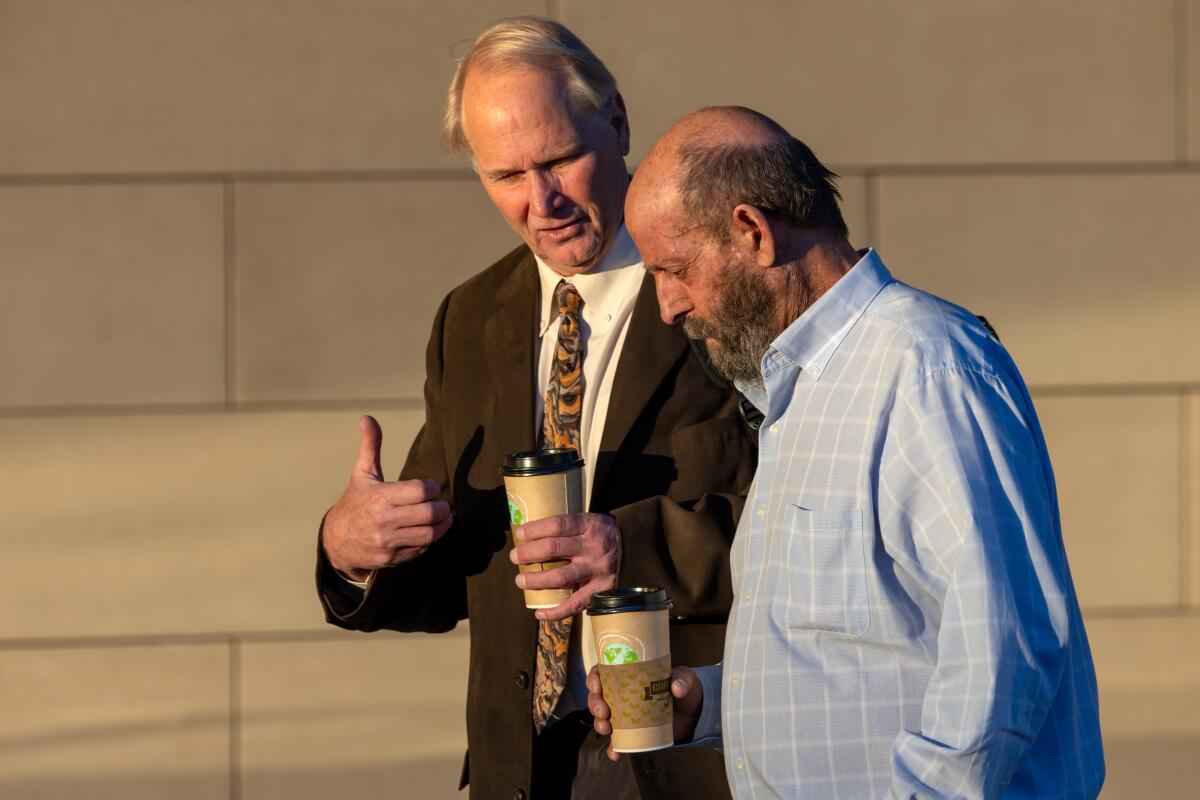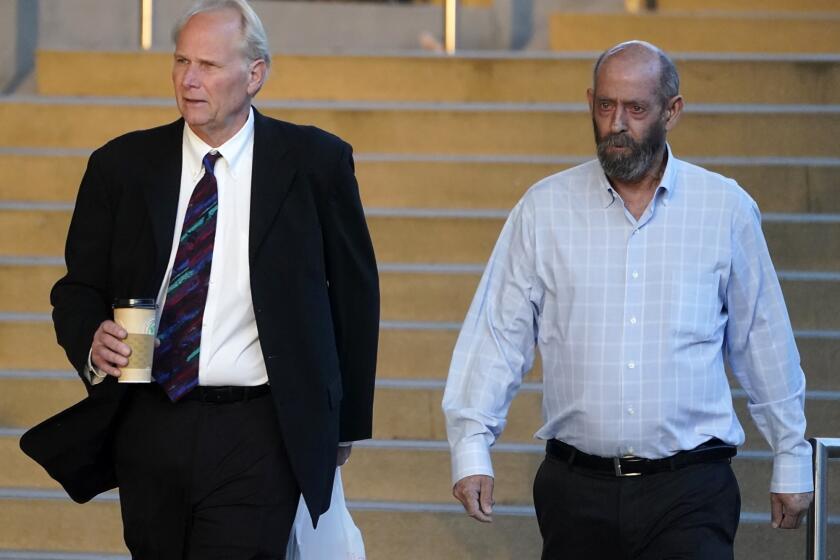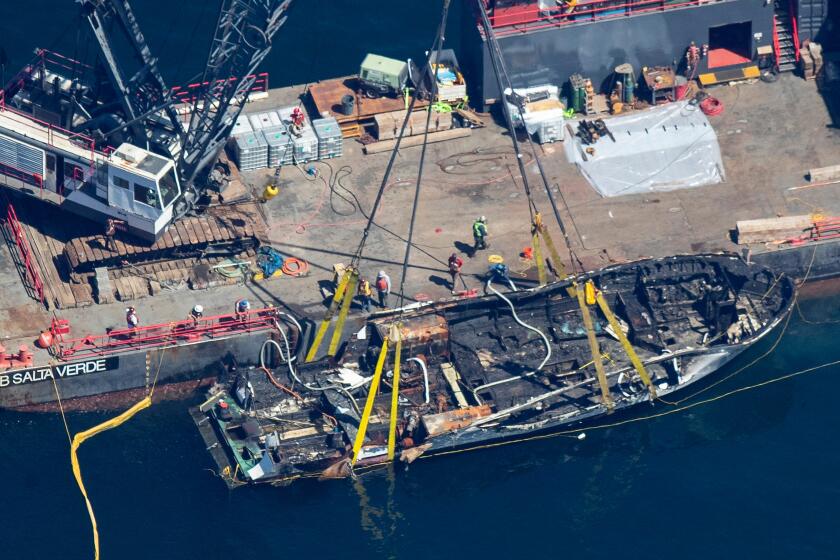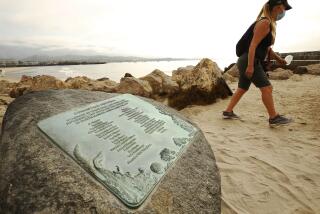‘We’re gonna die’: Final words, closing arguments in Conception boat fire trial

When their bodies were found, 56 feet below the water, some of the victims of the Conception dive boat fire were in mismatched shoes, thrown on in the dark as flames raced toward them. One person died clutching a phone, another a flashlight. Some died huddled together. Two were interlocked so tightly they had to be pried apart.
They died because their captain failed them, prosecutors told a jury Friday in U.S. District Court in Los Angeles, arguing that Jerry Boylan was guilty of manslaughter if his negligence caused even one of the 34 deaths aboard his ship over Labor Day weekend in 2019.
“He was the first to abandon the ship, the first to jump in the water,” Asst. U.S. Atty. Brian Faerstein told jurors in his closing argument.
Ignoring “basic rules of prudent seamanship” and the Certificate of Inspection requirements hanging in his own wheelhouse, prosecutors said, Boylan failed to order a roving night watch as people slept in a windowless bunk room below deck.
It amounted to “a roll of the dice every night that his passengers went to sleep ... in the remote and isolated waters of the Pacific Ocean,” Faerstein said.
Prosecutors say Jerry Boylan was negligent when he failed to institute a roving night watch or conduct proper fire drills before the fire that killed 34. He has pleaded not guilty.
Boylan had been a boat captain for 34 years and should have known the danger of fire, prosecutors said, and a roving night watch would have spotted the blaze before it raged out of control before dawn on Sept. 2, 2019, while the Conception was anchored off Santa Cruz Island.
Boylan also neglected to train his inexperienced crew in fire safety, giving only perfunctory instruction on where equipment was located, prosecutors said, and when he woke up to find the fire spreading on his boat, he was the first to jump into the water.
The Conception had two 50-foot-long fire hoses that could pump water into the boat from the ocean. Prosecutors said galley hand Michael Kohls, who had worked with Boylan for two years, did not know where the hoses were, and twice ran right by a hose during the fire, even as 34 people awaited rescue.
“You literally had the Pacific Ocean as your reservoir if you’re using these hoses,” Faerstein said. “He had an opportunity to take that fire hose out.”
Boylan called in a mayday before jumping overboard, actions that Faerstein characterized as “tantamount to giving up,” faulting Boylan for not using the public address system to alert passengers that there was a fire, perhaps giving them a chance to save themselves.
“These people were not a lost cause,” Faerstein said. “Smoke was coming in, but they still had a chance.”
Because safety training was so slipshod, Faerstein said, chaos ensued among crew when the fire spread through the boat. “There was no muscle memory. There was no automatic response. There was panic,” he said. “Having no training, they all went their own way — every man for himself.”
Prosecutors pointed to the account of crew member Ryan Sims, who testified that he approached Boylan about safety procedures on the day before the fatal fire, and that Boylan rebuffed him with a chuckle.
“He said, ‘When we get to it, Ryan,’” Faerstein said. “That’s how he felt about safety procedures.”
In her closing argument to jurors Friday, one of Boylan’s attorneys, Georgina Wakefield, disputed that the chuckle suggested Boylan’s indifference to his passengers’ safety.
“I don’t think a chuckle is nefarious,” Wakefield said. “You can interpret it however you want, but I don’t think it means anything.”
Wakefield said her client was not the coward the government painted him as, and that when he woke up, the encroaching flames were already 15 feet tall, confronting him with “an impossible situation.”
A commercial diving boat caught fire near the shoreline of Santa Cruz Island, Calif., early Monday. Many aboard the boat were believed to be sleeping below deck when the fire broke out in the pre-dawn hours.
She said Boylan had done things “the Fritzler way” for decades, referring to boat owner Glen Fritzler, who did not require a roving night watch. “Jerry cared. ... He could have done better,” Wakefield said. “There absolutely should have been a roving patrol.” But he did not know he was endangering people’s lives, she said. “He didn’t know he should have done anything differently.” The fire was a tragedy but not the fault of a man “making a day wage at 66 years old.”
Wakefield zeroed in on the 39 minutes between the time the last Conception crew member went to sleep, 2:35 a.m., and the time Boylan woke up and called in the mayday, 3:14 a.m. The fire started and became “an unstoppable inferno” during that interval, she said, suggesting that a roving patrol might not have helped.
“A roving patrol that walks around once every hour would not have changed what happened here,” Wakefield said.
By condemning Boylan’s behavior, the government was implying “that Jerry should have stayed on the boat, and he should have died,” Wakefield said. If he had, she said, prosecutors would have looked for someone else to blame.
Families of the Conception victims have filled the courtroom in downtown Los Angeles during the eight-day trial, the testimony punctuated by the sound of their stifled weeping. For the families, one of the hardest pieces of evidence to bear was the 24-second video taken from the iPhone of Patricia Ann Beitzinger, an Arizona woman who died on the boat.
She took the video at 3:17 a.m., three minutes after Boylan’s mayday call. The video, played early in the trial and again Friday, shows the dark outlines of people trapped in the bunk room as the fire approaches. The voices are muffled and difficult to hear, but prosecutors supplied a transcript to jurors:
“There’s got to be a way out...”
“There’s got to be more extinguishers...”
“We’re gonna die...”
The jury will begin deliberating Boylan’s fate Monday morning. He could face 10 years in prison if convicted.
More to Read
Sign up for Essential California
The most important California stories and recommendations in your inbox every morning.
You may occasionally receive promotional content from the Los Angeles Times.













